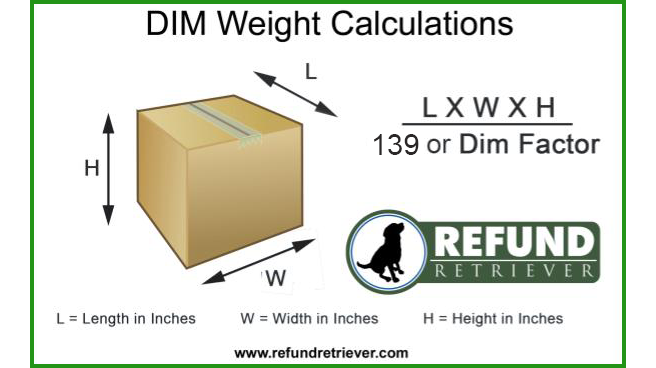UPS Ground and FedEx Ground Home Delivery modify their shipping rates each year. Rates will be based on the size of the package. This pricing program is known as Dimensional Weight Pricing, also referred to as DIM Weight.
Since 2007, UPS and FedEx have only used DIM weight for packages larger than three cubic feet. But starting in 2015, DIM weight pricing applies to every package shipped using ground delivery. DIM weight is calculated by multiplying a package’s length by width by height and then dividing by a standard dimensional divisor.
What is dimensional weight?
Dimensional weight DIM reflects package size, the amount of space a package occupies on a delivery truck in relation to the actual package weight. Carriers want to fill those little trucks with as many packages as possible.
Dimensional Weight = (Length x Width x Height)/Divisor
A 5-pound box of lead versus a 5-pound down-filled sleeping bag in a box weigh the same but are very different sizes. With the previous pricing method, shipping carriers charge by weight. So, the cost to ship the box with lead is the same as shipping the box with the sleeping bag.
| Service | Dimensional Divisor |
| UPS Ground | 139 |
| FedEx Ground/Home Delivery | 139 |
| UPS Express | 139 |
| FedEx Express | 139 |
| USPS Priority/Express/Parcel | 166 |
Steps to Calculate Dimensional Weight DIM
- Measure the length, width, and height of a package using each side’s longest point.
- Shipping carriers request you round up to the nearest whole number when calculating the dimensional weight.
- Next, multiply those package dimensions to get the cubic size of the package. So then a package that measures 12 inches by 12 inches by 12 inches equals 1,728 cubic inches.
- Lastly, the package’s cubic size is divided by a dimensional factor, aka DIM divisor. DIM divisors are numbers set by UPS and FedEx.

FedEx & UPS Calculations
Here’s an example of a domestic shipment. Take a domestic ground package in a 25 x 26 x 18 cardboard box. It only weighs 40 pounds. Your calculation would be (25 x 26 x 18) / 166 = 70.48 dim weight (carrier will round up to 71 lbs). The dimensional weight of 71 lbs is greater than the actual weight of 40 lbs. Therefore, you will be billed for a 71 pound shipment. Not only are you paying for 31 additional pounds now, but you also get above the threshold for additional handling fees. If you don’t remember why this is bad, check out our 2013 blog post, Why 71 Lbs. can be bad news.
How to Lower DIM Impacts
To combat the cost, consider seeking out a dimensional weight waiver or working to negotiate a higher standard dimensional divisor. Gone are the days of just grabbing the closest box and sending it out the door. Remember, size DOES matter.
Contact Refund Retriever to help reduce your shipping costs. Let us show you dimensional weight DIM weight packages and get refunds for your late packages and billing mistakes.

